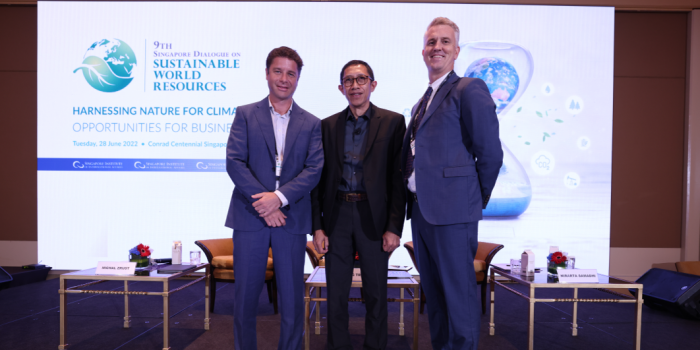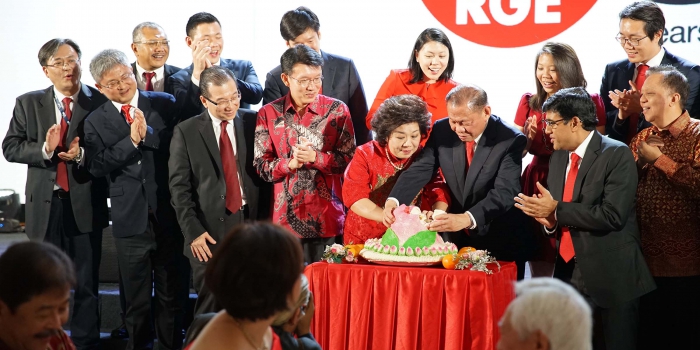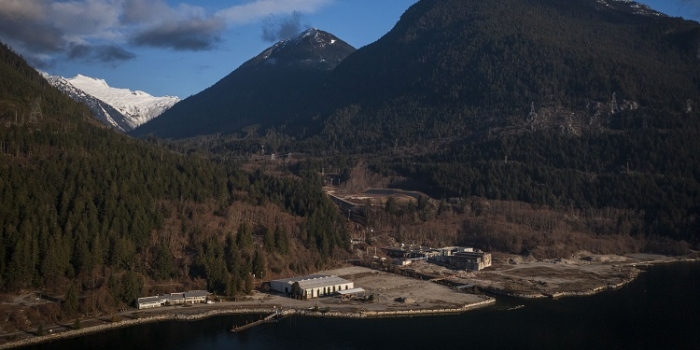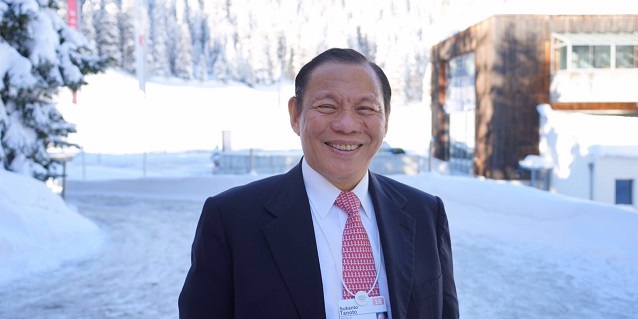The world continues to ramp up efforts in forest conservation, with ambitious commitments to halting and reversing forest loss.
Following the signing of an international treaty to achieve net zero greenhouse gas emissions and limit global warming at COP26 last year, both public and private sectors have made commitments to advance nature based solutions.
Yet, delivering on these promises and commitments may prove to be difficult. So, how can businesses work effectively to achieve their targets?
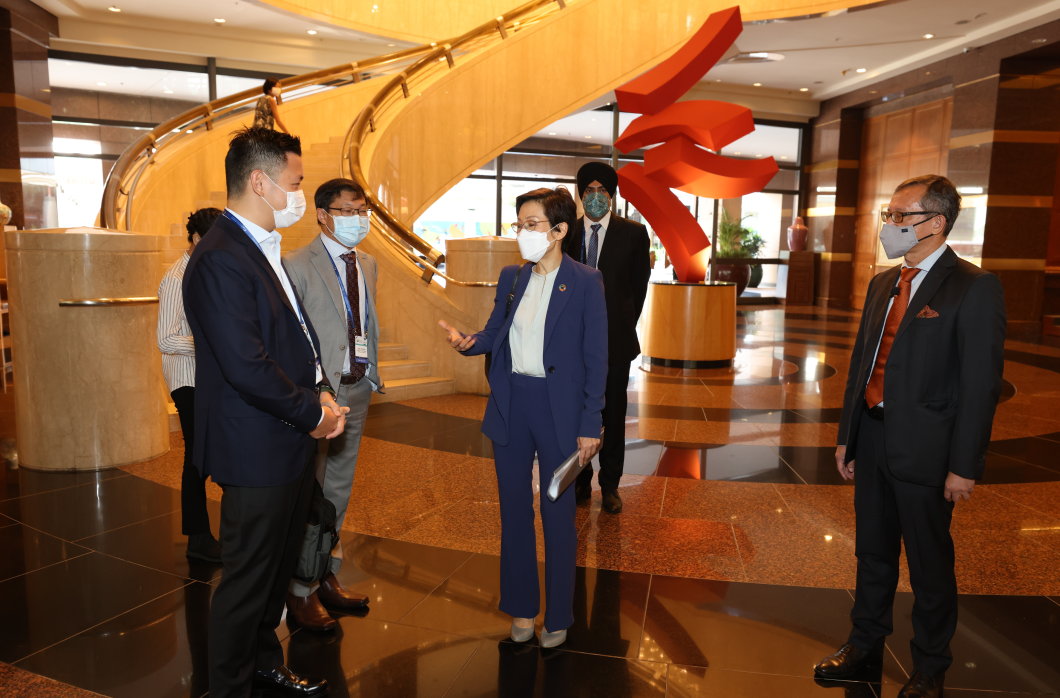
Mr. Anderson Tanoto (left), Manager Director of RGE, a sponsor of the event, welcoming the arrival of Guest-of-Honour, Ms. Grace Fu, Singapore’s Minister for Sustainability and the Environment (centre)
During a panel discussion at the 9th Singapore Dialogue on Sustainable World Resources held on 28 June 2022, organised by the Singapore Institute of International Affairs (SIIA), Mr. Craig Tribolet, Sustainability Operations Manager at APRIL, shared the company’s approach to forest protection and conservation.
Titled ‘Innovative and Cooperative Approaches to Forest Conservation’, the panel also featured several leading experts in the industry including Mr. Herry Purnomo, Senior Scientist and Indonesia Country Director at the Center for International Forestry Research (CIFOR); Mr. Michal Zrust, Co-Founder and Executive Director of Lestari Capital; Mr. Rod Taylor, Global Director at World Resources Institute (WRI); with Dr. Nirarta Samadhi, Country Director at WRI Indonesia, as the moderator.
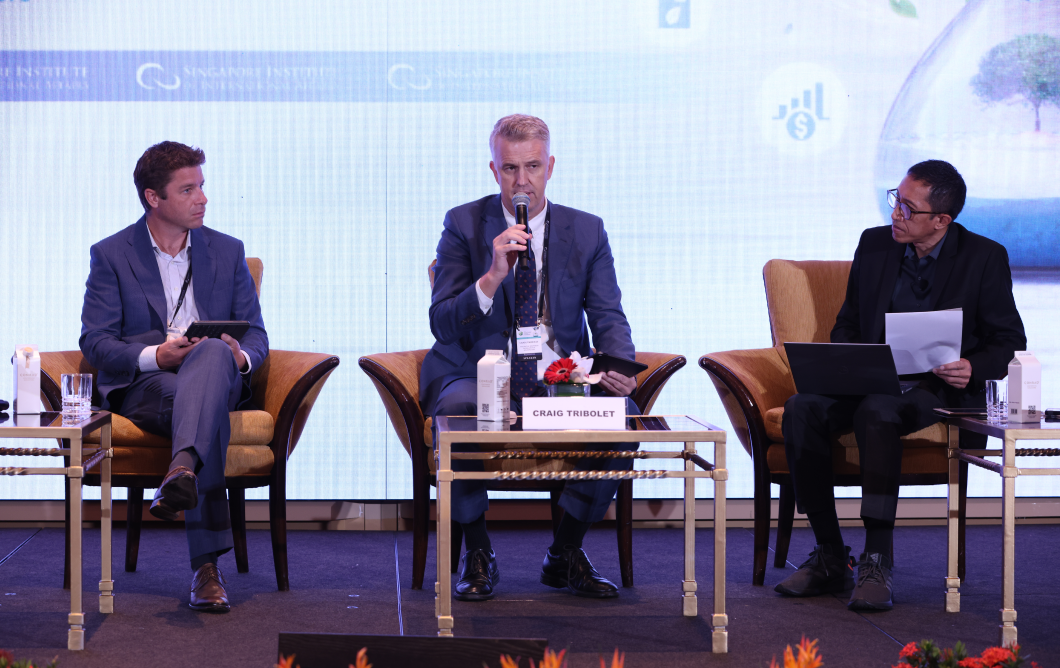
The speakers for the panel on ‘Innovative and Cooperative Approaches to Forest Conservation’ included (from left to right) Mr. Michal Zrust, Co-Founder and Executive Director of Lestari Capital, Mr. Craig Tribolet, Sustainability Operations Manager at APRIL, and Dr. Nirarta Samadhi, Country Director at WRI Indonesia as the moderator
Kicking off the discussion, Mr. Tribolet shared APRIL’s conservation efforts and its plans, emphasising the need for businesses to act with urgency and to understand the key drivers of deforestation. He highlighted the value of strong internal business processes, citing the following examples:
- APRIL’s Sustainable Forest Management Policy 2.0, which was created with inputs from a range of stakeholders in 2015 and embedded into operational practices;
- The company’s APRIL 2030 commitments, comprising of a range of ambitious targets to deliver a positive impact on climate, nature, and people;
- APRIL’s commitment to ensuring that all relevant personnel in the organisation are involved in the business of conservation to prevent silos forming.
Mr. Tribolet also stressed the importance of partnerships across sectors with a range of stakeholders and rights holders, especially the local communities.
Everyone has a Role to Play in Being Forest-Positive
The panel agreed that local communities are key stakeholders and are a main success driver for forest conservation efforts. A clear understanding of local communities’ needs, priorities, and value systems is vital as such communities are incredibly complex.
“Conservation can also be a particularly sensitive issue for local communities, who may have different value systems, approaches, and uses of the forest,” Mr. Tribolet said. “I think what is really critical for APRIL, and for people operating in this space, is to understand that the community is actually the key stakeholder.”
Adopting an insider perspective, Dr. Purnomo shared that the protection of the community’s livelihood in the coastal and fishery areas is equally important. Climate protection is often not as relevant to locals.
In response, he suggested developing solutions that are framed to benefit the community, to make the issue more relevant to the locals, instead of discussing climate protection generally.
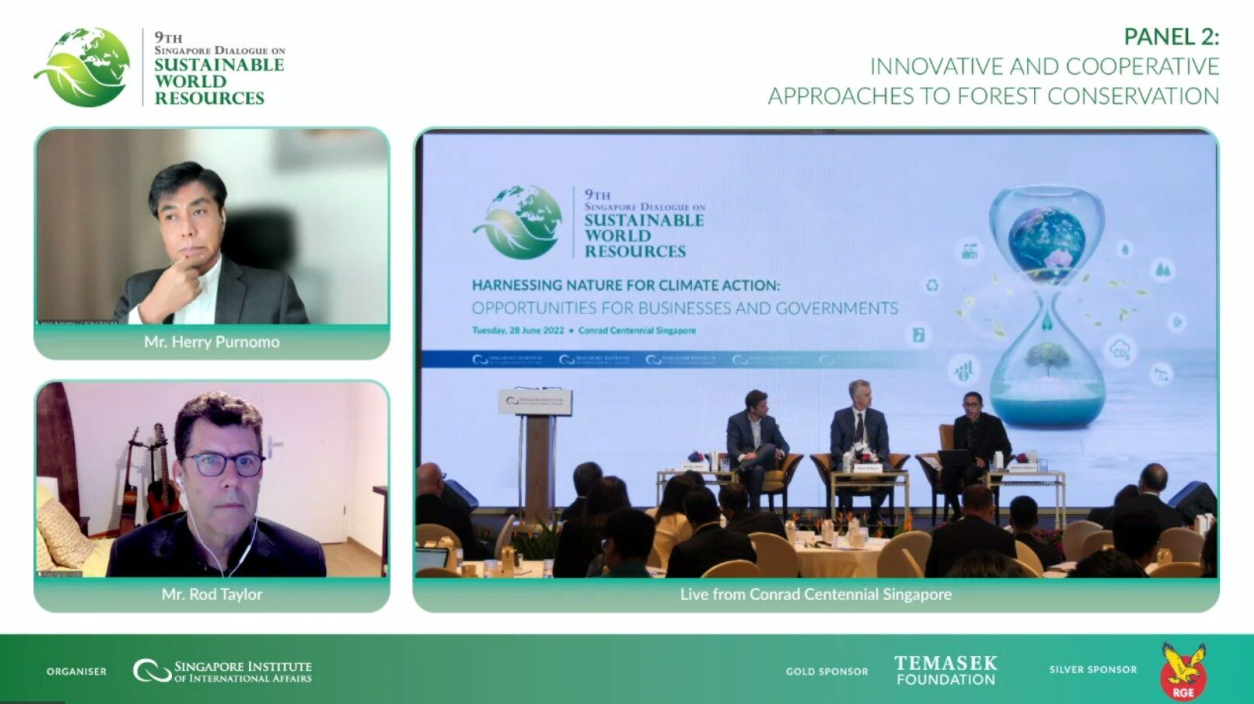
The panel discussion also featured leading industry experts including (top) Mr Herry Purnomo, Senior Scientist and Indonesia Country Director at the Center for International Forestry Research (CIFOR) and (bottom) Mr Rod Taylor, Global Director at World Resources Institute (WRI)
Mr. Tribolet also mentioned APRIL’s use of voluntary community conservation agreements with the local communities to engage the local populace. This typically involves participatory mapping with local communities, making it easier to identify conservable areas of remaining natural forest within village boundaries, versus individual efforts.
To advance this initiative, APRIL is developing a mechanism to support communities in the voluntary conservation of these areas through local patrol capability, increasing agricultural productivity and market access, and making direct payments to the community for the ecosystem service.
Beyond local communities, the panel agreed that stakeholders must foster partnerships at all levels and areas to build a truly sustainable landscape.
There is also a heightened need to adopt proactive and forest-positive approaches, going beyond simply minimising deforestation and avoiding negative impacts.
Looking Beyond Carbon Reduction
On the other hand, while reducing carbon emissions is essential, this should not be seen as the main focus. The most important outcome should be achieving a healthy state of biodiversity.
“In some of the earlier sessions, we talked about carbon and biodiversity as being sort of an icing on the carbon credits. We need to be thinking about this the other way around, we need to be thinking about nature. Carbon reduction is a co-benefit of restoring nature. We can have a cool planet by reducing carbon emissions, but if its biodiversity collapses, we’re not in a very good space. There is a real opportunity here to develop things that change the current situation,” Mr. Zrust said.
On the topic of using new technology to aid conservation efforts, Mr. Taylor talked about free-access sentinel satellites with radar imagery for land monitoring through haze and clouds. They detect deforestation and transmit alerts rapidly, facilitating the response and investigation efforts between companies, law enforcement and NGOs. He also emphasised the importance of smooth collaboration between stakeholders to tackle conservation issues.
Businesses must also ensure that conservation efforts are financially sustainable. Mr. Tribolet provided insights about APRIL’s protection-production model, which enables APRIL to invest in long-term conservation and ecosystem protection at a massive scale, including its Riau Ecosystem Restoration project in Sumatra, which covers more than 150,000 hectares and is home to more than 60 animal species of concern.
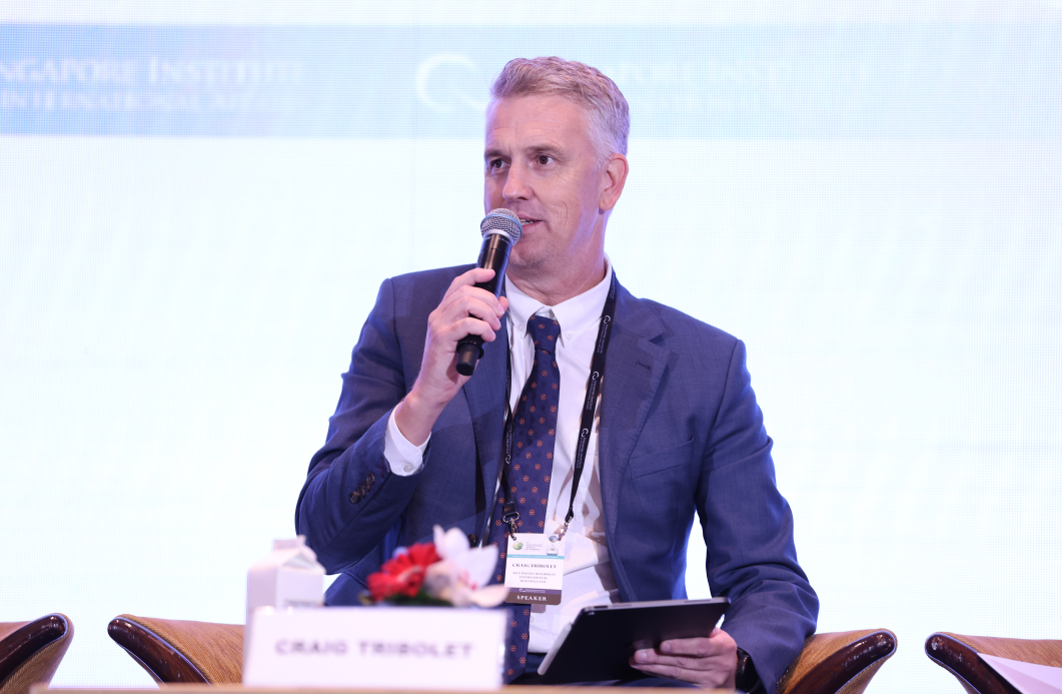
Mr. Craig Tribolet, Sustainability Operations Manager at APRIL, speaks at the panel discussion
“APRIL applies a $1 per tonne tariff on every delivered tonne of fibre, which directly funded our conservation work last year; that amounted to $12 million. So, we are absolutely linking our financing to conservation and to manufacturing,” he said.
Moving Forward into a Greener World
As climate accounting and reporting techniques progress, it is necessary to align best practices more deeply with global commodity supply chains.
Mr. Taylor elaborated: “A lot of companies are worried about the emissions attached to the commodities they procure. I think this new interest in both the climate and commodities is probably driving traders to eliminate deforestation from their supply chains in the next decade.”
He also cautioned against having too many rules that do not align well and highlighted the importance of database solutions in the fight for forest conservations.
Mr. Taylor, who sits on the board of the Integrity Council for the Voluntary Carbon Markets, disclosed that the Council is poised to release benchmark standards for carbon projects in July. He also pointed out the tricky nature of pricing nature-based solutions into the market, describing it as a balancing act between setting a suitable entry bar, creating the appropriate safeguards, and ensuring greater transparency.
Ultimately, successful conservation efforts depend on the integrity of companies. To ensure transparency in their policies, APRIL’s implementation of its sustainability commitments is audited every year by KPMG.
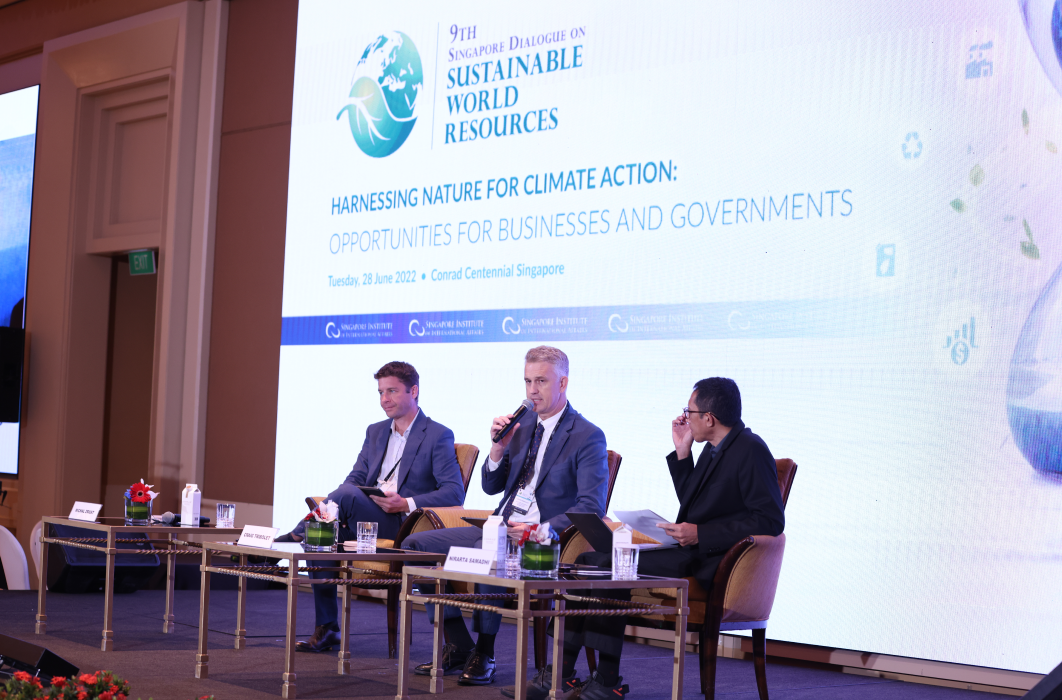
Speakers for the panel on ‘Innovative and Cooperative Approaches to Forest Conservation’ including (from left to right) Mr. Michal Zrust, Co-Founder and Executive Director of Lestari Capital, Mr. Craig Tribolet, Sustainability Operations Manager at APRIL, and Dr. Nirarta Samadhi, Country Director at WRI Indonesia
“Every year, we make that audit report publicly available, and we present it to public forums in Indonesia. That’s a critical part of our overall journey because it keeps us honest,” Mr. Tribolet concluded.
APRIL has been involved in forest protection and conservation since 1994. In 2005, it engaged in one of the first regional High Conservation Values (HCV) assessments. Since then, the total area of restoration and conservation forest has grown to over 360,000 hectares.



